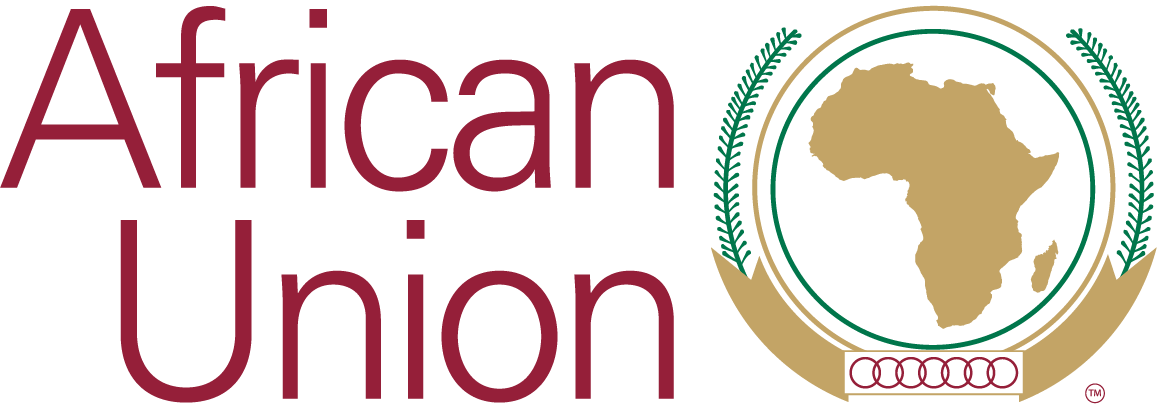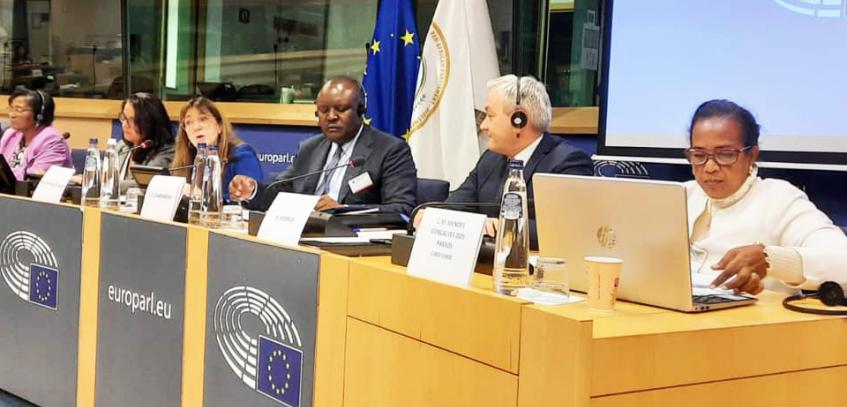Declaration
Brussels, 8-9 December 2022 - Following the major developments of the past year, the EP PAP Inter-Parliamentary Meeting has reinforced the cooperation between the African Union and the European Union and renewed the joint commitment to the parliamentary dimension of the Partnership in challenging times.
The new Pan-African Parliament in the African Union architecture
The European Parliament supports the Pan-African Parliament in its endeavour to enhance its role in the African Union architecture and ultimately become a fully-fledged legislative body of the African Union.
We will cooperate to strengthen the role of the Pan-African Parliament in connecting parliamentarians and citizens with AU and EU policies, for the benefit of inclusive and sustainable development, equality, peace and human rights on both continents.
The European Parliament and the Pan-African Parliament will work together to promote continent-to-continent parliamentary dialogue, stimulate Pan-African integration and encourage international cooperation.
We welcome the agreement of the 11th Commission-to-Commission meeting between the European Union and the African Union, giving new impetus to the implementation of the EU-AU Summit Commitments and emphasising the parliament’s role in monitoring and overseeing the effective implementation of the AU- EU partnership.
European Parliament and Pan-African Parliament cooperation on gender equality and
Interaction with parliamentary networks of women's organisations
Women’s empowerment and gender equality are a common priority at the heart of the work of the European Parliament and the Pan-African Parliament. We are committed to ensuring greater gender equality through the EU Gender Equality Strategy 2020-2025, the African Union Strategy on Gender Equality and Women’s Empowerment 2018-2028 and the fulfilment of Sustainable Development Goal 5 and Aspiration 6 of Agenda 2063.
We strive to mainstream gender and ensure that bold commitments on gender equality and inclusiveness are prioritized. Courageous and holistic initiatives for advancing women’s economic empowerment and gender-sensitive budgets in national and regional parliaments are necessary. The Pan-African Parliament and the European Parliament also need to address and fight against political violence. We reaffirm our common goal to combat all forms of violence against women and girls, including female genital mutilation, femicides, and child or forced marriages.
We underline that women and girls are particularly at risk as they are often specifically targeted and at an increased risk of violence in conflict and post-conflict situations; we call to accelerate efforts to eradicate the scourge of sexual and gender-based violence and the use of sexual violence as a weapon of war in armed conflicts, to protect victims, to put an end to impunity for the perpetrators, and to guarantee access to justice, reparations and redress for survivors;
Gender equality and gender-sensitive parliaments are drivers of change for more resilient and fairer societies. Together we must unleash the potential of women and girls in Africa and in Europe.
Strengthening resilience in nutrition on the African continent in the current global context
of food crisis: Accelerating human capital and social and economic development
Nutrition is a key driver for food systems transformation. We are committed to responding to the ongoing global food crisis and upholding nutrition needs in a global context marked by the impacts of the global pandemic, climate change, biodiversity loss and conflicts including Russia’s war in Ukraine, which has disrupted global production and supply chains. While access to food is essential, we need to address the major drivers of food and nutrition insecurity, including chronic poverty, economic shocks, climate change, biodiversity loss, and conflict. We will only strengthen Africa’s nutrition and food security promoting an integrated approach which values local and small-scale agriculture and food production based on agroecological practices while accelerating globally the food system transition towards sustainability and resilience to better prepare for future crises and shocks. Local governance and a right-to-food-based approach are essential in this transition and need to ensure food policy is effectively implemented in partnership with local communities and organisations, bringing their voices into food systems governance.
Through political dialogue, we will contribute to working towards the achievement of Aspiration 1 of Agenda 2063, envisioning a prosperous Africa based on inclusive growth and sustainable development and the UN Sustainable Development Goal 2, aiming to end hunger and malnutrition by 2030, increasing agricultural productivity and ensuring sustainable food production systems.
European Parliament and Pan-African Parliament cooperation: focus on peace and security
The two delegations note that the war in Ukraine adversely impacts all African and European countries and refer to national positions as expressed in the UN Security Council and the UN General Assembly. However, the European Parliament Delegation reiterated its strong condemnation of the illegal and unjustified and unprovoked war of aggression by the Russian Federation against Ukraine which is causing immense human suffering and demands the complete unconditional withdrawal of all Russian forces from the territory of Ukraine.
The two delegations call to resolve the war through negotiation and dialogue in respect of the principles and objectives of the UN Charter as to preserve international peace and security.
We welcome the most recent AU efforts to peaceful solutions to the conflicts in Ethiopia and the Democratic Republic of the Congo, and call on local and regional actors to contribute to peace and reconciliation while addressing the conflict’s root causes and considering the role of youth and women in conflict resolution efforts. Furthermore, we welcome efforts by regional bodies such as ECOWAS, IGAD, and ECCAS when it comes to fostering democratic transitions and inclusive national dialogues. We both support these initiatives and realise that further efforts and progress are needed. We also encourage collaboration, constructive dialogue and mutual consultation between our two parliaments to further discuss issues of divergent views and ideologies.
We call on governments to strengthen mechanisms of early warning and conflict prevention and underlying that parliamentarians in Africa and Europe can play a valuable role in mediation, conflict prevention, tackling drivers of conflict and upholding international humanitarian law.
Enhancing youth participation in decision-making and society
With the world's youth population at its all-time high, we firmly believe that young people should be equal participants in political processes at local, national and global levels. We recognise that further steps and efforts are needed to ensure young generations are included in a meaningful way in decision-making and are given appropriate opportunities to work and strive. Involving young people in politics and society is not merely a question of inclusion, but it is of great importance for economic growth, and innovation.
We commit to promoting an enabling environment, young’s people skills and capacities and creating spaces for youth engagement in politics and decision-making. It is necessary to develop youth-friendly tools for political participation and promote youth forums, parliaments, and advisory committees to Parliaments. We commend the adoption of the first Youth Action Plan (YAP) in EU External Action 2022-2027, to strengthen engagement with young people worldwide.
For the achievement of all these priorities, we want to stress that the institutional reform of the Pan-African Parliament will be key to strengthening its Committee, Bureau and Plenary and, therefore, our parliamentary cooperation.
-Ends-








